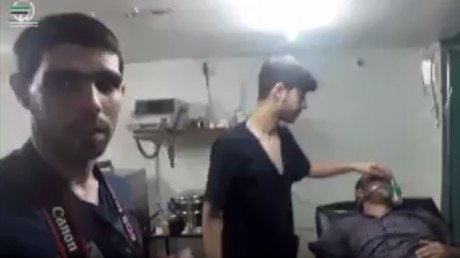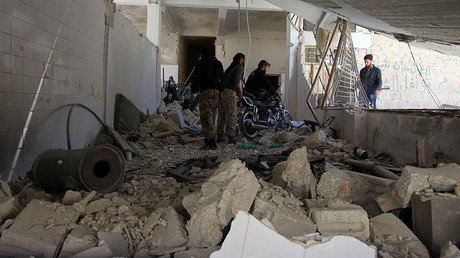‘Many gaps & omissions’ plague chemical watchdog’s Idlib incident report – Russian OPCW rep to RT
The Organization for the Prohibition of Chemical Weapons (OPCW) fact finding mission has failed to meet even the basic procedures of an investigation, thus rendering the Idlib chemical incident report inconclusive and full of gaps, the Russian representative to the OPCW has told RT.
The OPCW report on April’s chemical incident in Syria’s Idlib province was presented last Friday despite being inconclusive and lacking evidence. It stated the mission had established the fact of sarin gas use.
The said document was used by the US and its allies Wednesday, to once again pin blame for the incident on the Syrian government during an extraordinary session of OPCW’s executive council, Alexander Shulgin, Russia’s Permanent Representative to the Hague based organization told RT.
“It was the United States-led western group of countries that came forward with the initiative of this meeting. As it turned out their purpose was to make some noises about the culpability of the Syrian government and president Assad personally in the tragedy of the use of chemical weapons in the Khan Shaykhun region on April 4,” Shulgin said.
While the fact-finding mission did not have a “mandate to attribute the responsibility, the United States and their allies did not hesitate to interpret the results of the report, the fact-finding report, as a one hundred percent proof of the guilt of the Syrian government and President Assad in this tragedy,” Shulgin noted.
The most glaring problem with the report, according to Shulgin, is the fact that the mission never actually visited the site of the alleged attack and collected all the evidence from militant groups controlling the area, thus being unable to determine its authenticity.
“The main problem was that the fact-finding mission has not visited either Khan Shaykhun, the alleged place of the usage of the chemical weapons, or Shayrat Air Base, from where, according to our American partners, the Syrian planes had taken off to carry out this chemical attack,” Shulgin underlined.
Russian representatives have provided arguments on “why we cannot consider this report as satisfactory,” pointing out that the investigation does not measure up to even basic forensic procedures.
“There are many omissions or gaps in the text of the report itself. We pointed out to some of them, the experts admitted they did not implement entirely a chain of custody, a basic procedure established by the organization to collect samples to ensure their custody,” Shulgin told RT.
“In other words we don’t know exactly where the bodies had been recovered, where the evidence had been collected, who had custody of [this evidence]. The second point, very important point, the team was unable to establish what actually had happened in Khan Shaykhun… whether it was dispersion or explosion, what kind of explosion, aerial or on the ground it’s absolutely not established.”
Moreover, Shulgin questioned the recent allegations by high-ranking US officials that the Syrian government was preparing a new chemical attack, based on some secret “intelligence data,” saying it’s illogical, especially after Russia proposed to send an international team of experts to the Shayrat Air Base – a suggestion dismissed by Washington.
“We insisted upon this specific provision and with Iranian partners we came forward with a draft decision in order to send a team of experts not only to Khan Shaykhun but to Shayrat Air Base. The United States and its allies did not allow us to have this decision,” Shulgin said.
“And now we see that it was the wrong decision, because on June 26, [our] American partners… made statements according to intelligence data, that there allegedly are some kind of preparations on the Syrian side to launch a new attack and this is absolutely not logical.”
Russian Foreign Minister Sergey Lavrov also criticized the OPCW last week for failing to visit the site of the attack, saying, that it is “acting unintelligibly.” Lavrov also drew attention to the fact that the FFM report provides no information on where the sarin gas that was allegedly used in the attack came from.
An estimated 74 to 100 or more civilians were killed and hundreds were injured in the April 4 attack, according to various reports. Washington rushed to blame Damascus based on open-source intelligence, while the Syrian government strongly denied responsibility for the attack.
On April 7, US President Donald Trump authorized the firing of 59 Tomahawk cruise missiles at the Syrian military airfield in Shayrat from where US intelligence said the chemical attack was launched.














